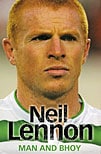 Man and Bhoy
Man and Bhoy
by Neil Lennon with Martin Hannon
Harper Sport, £17.99
Reviewed by Robbie Meredith
From WSC 241 March 2007
Irish footballers have been among the most prominent exponents of the mea culpa sports autobiography in recent years. Tony Cascarino and Paul McGrath have produced open and apologetic works detailing personal failure, far in tone from the bland self-justification inherent in most of the genre.
Man and Bhoy seems, at first, to promise similar raw revelation. The opening chapter of the book recalls, at length, the events of August 21, 2002, when the BBC newsroom in Belfast received a phone call from a loyalist terrorist group threatening Lennon’s life hours before he was due to captain Northern Ireland in an international at Windsor Park. Lennon’s “crime” was to play for Celtic and the death threat, whether serious or not, was the final, devastating climax to a season-and-a-half of abuse from a significant minority of Northern Ireland supporters whenever he appeared in Belfast. It’s a period that should shame numerous people, including some members of the media and the Irish Football Association who, at times, gave the player very ambivalent backing. The impact of the situation on Lennon and his family, who still live in the small Armagh town of Lurgan, is evident.
Elsewhere, Lennon paints an accurate picture of life as a child in a divided provincial town during the “Troubles”, including the murder of a school friend and the riots resulting from the hunger strikes of the early 1980s. Further on in the book he admits to periodic problems with depression and alcohol during his career and expresses enthusiasm for biographies of Che Guevara. These nuances, his early struggles at Manchester City and Crewe, and being booted in the face by Alan Shearer appear to give him a perspective beyond the end of his wallet. He comes across as a more sensitive and thoughtful individual than his public persona, as a hard-nosed midfielder with Leicester City and Celtic, would suggest.
Yet this is ultimately a frustrating read, mainly because the revelatory approach to Lennon’s personal life doesn’t extend to his discussion of football. Dressing room omertà applies, which means that, although he has played for a couple of clubs in interesting times among some of the stronger characters in the game, we learn little about them that we couldn’t glean from scanning the football press. We learn that Steve Walsh, for instance, is a “tough-as-teak centre-half” and “no saint”, but we never find out why this is the case. “Trouble seemed to follow” Stan Collymore around, while Martin O’Neill is obviously respected by his players, but anyone looking for an insight into what makes him a revered manager will be disappointed. Detail is also light in other areas. The Leicester ticket scandal that marred the 1999 League Cup final is addressed, but the name of the player who “came into the dressing room with a sports bag full of money and handed out wads of cash” is never revealed, and Lennon doesn’t question why footballers on five figures a week ignored FA rules for the sake of seven grand.
Regrettably, the “and then…” feel to the depiction of much of the action on the pitch, along with an obligatory grumble about the press, signals that the bubble in which so many professional footballers exist envelops Lennon in the end.